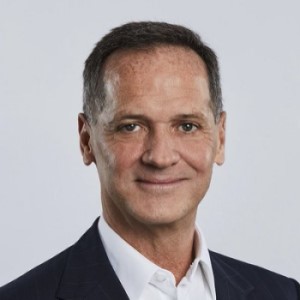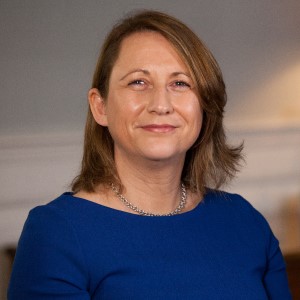Taking stock of the UK’s Seventh Carbon Budget
The latest carbon budget, released by the Climate Change Committee (CCC) on 26 February, highlights electrification and private sector financing as crucial for reducing emissions.

“We recently announced Lloyds Bank’s Corporate and Institutional £43 million investment in the new £62 million Community Investment Enterprise Fund (CIEF) which supports lending to SMEs via Community Development Finance Institutions (CDFIs).”

With 99% of all businesses in the UK classified as small, a strong performance from the UK’s nearly six million SMEs is crucial to our economy.1 And according to data from The Social Market Foundation, despite accounting for just 1% of small to medium-sized enterprises, start-ups add a massive £500 billion to the UK economy each year.2
Given this, it’s imperative that as one of the biggest financial organisations in the UK, we do all we can to support SMEs and recognise the value they bring not just to the economy, but to local communities as well.
So, as part of our commitment to regional development, we recently announced Lloyds Bank’s Corporate and Institutional £43 million investment in the new £62 million Community Investment Enterprise Fund (CIEF) which supports lending to SMEs via Community Development Finance Institutions (CDFIs) based in Bradford, Doncaster and Wolverhampton.
Lloyds Bank will be the senior funder in the transaction, with Big Society Capital acting as junior funder – providing entrepreneurs with alternative funding options to get their businesses off the ground and succeed.
The fund will be managed by Social Investment Scotland (SIS), which has been investing in the social sector since 2001 and is itself a CDFI. Responsible Finance and the Impact Investing Institute have both played a key role in bringing this to fruition along with the three participating CDFIs.
But what exactly are CDFIs? And why are they so vital for certain SMEs?
If you’re a new business, securing funding can unlock growth potential. Yet some SMEs may find it more difficult than others to get early funding because they do not have a track record, strong credit rating or assets to provide as security. This is where CDFIs can help.
CDFIs are small, non-profit organisations offering financial support and alternative sources of credit to people, organisations and businesses.
The idea here is that supporting a finance ecosystem with a range of lenders with differing credit models and approaches will mean businesses have the widest range of credit options available to them.

Data from Responsible Finance shows that total CDFI lending in 2022 increased by 20% to £248 million, of which £81m was lent to start-ups and established small businesses. Small business loans tend to be for sums between £25,000 and £100,000, although CDFIs can offer loans of as little as £1,000 for start-up businesses.
But although many SMEs access finance this way, CDFIs themselves face barriers to achieving long-term sustainability and securing capital at scale to meet the demand of small businesses – they raise capital from banks, foundations, and other public sector sources. This is one of the reasons why our recent announcement is so important.
Our funding will be issued through CIEF and alongside contributions from Big Society Capital and the three participating CDFIs – BCRS Business Loans, Business Enterprise Fund and Finance for Enterprise – will ensure these CDFIs get the capital they need to meet demand.
It's important to note just how many businesses this new wholesale funding can help. Based on an average loan size of £75,000, CIEF could invest in around 800 SMEs, supporting approximately 10,500 jobs.
That said, CDFIs may not be the best option for everyone. Like any loans, failing to meet payment deadlines can have a negative impact on an individual’s credit score. Additionally, CDFIs may require business owners to sign personal guarantees and any business or personal assets might be used as security for the loan.3

"Based on an average loan size of £75,000, CIEF could invest in around 800 SMEs supporting approximately 10,500 jobs."
At the time of writing, one million of the UK’s nearly six million SMEs are owned by ethnic minority businesspeople – they generate around £74 billion each year, and employ three million workers according to research from Small Business Commissioner.4
When it comes to CDFIs, a higher number of these loans are given to underrepresented groups such as Ethnic Minority Businesses and Women entrepreneurs. And the fact they offer tailored support and mentoring means they can be a good option for these communities too.5
Moreover, CDFIs are also generally focused in areas of higher deprivation. Analysis by the British Business Bank shows that around 50% of CDFI lending is to businesses in the UK’s 35% most deprived areas.6 In essence, this means that deploying capital to CDFIs enables them to continue to reach underserved people and places, boost economic growth, promote employment creation, and reduce inequality. We hope that our investment will encourage other financial institutions to invest in CDFIs to ensure local businesses – and, consequently, local communities – flourish.
"Analysis by the British Business Bank shows that around 50% of CDFI lending is to businesses in the UK’s 35% most deprived areas."
SMEs are the heart of our economy and, as such, we’ll continue to do everything in our power to support them. Becoming the first mainstream lender to support an SME-focused CDFI fund underlines our commitment to investing in sustainable business and regional development – specifically within disadvantaged areas of the UK.
More broadly, we currently support one million British businesses with leading digital and relationship banking services as they start up, grow, and thrive. In fact, we helped 105,000 small businesses in 2023. And more generally, we provided around 600,000 businesses with advice to navigate the current challenging economic environment, too.7

CEO, Corporate & Institutional Banking.
John joined Lloyds Banking Group in September 2022 as CEO, Corporate & Institutional Banking.
John has more than 37 years’ experience in corporate and investment banking, as well as in retail banking. He was most recently at MUFG, where he was Regional Executive and CEO for EMEA with responsibility for all of its Global Markets, Corporate and Investment Banking businesses. He spent 15 years at Barclays, latterly as CEO for Corporate Banking and previously as head of its European investment banking business.

CEO, Business & Commercial Banking
Prior to joining the Group in 2017 through the acquisition of MBNA, where Elyn was Chief Financial Officer, she held a number of finance leadership roles. Before her current role, Elyn was the Managing Director, Consumer Finance, responsible for the Group’s Consumer Credit Card, Commercial Credit Card, Unsecured Personal Loan, Motor Finance and Motor Leasing portfolios in the UK.
Elyn is a Fellow member of the Chartered Institute of Management Accountants, lives in the North West, acted as Lloyds Banking Group’s Ambassador for the North for three years to December 2021, and is a Trustee of the MBNA Foundation, a charitable trust.
The latest carbon budget, released by the Climate Change Committee (CCC) on 26 February, highlights electrification and private sector financing as crucial for reducing emissions.
Charlie Nunn meets our clients at Newlyns Farm, to talk about the part they play in their local community, the role sustainability plays in farming, and how they’re adapting to new challenges.
What is the Voluntary Carbon Market (VCM) and how can it help reduce or remove greenhouse gas emissions, and direct funds to critical areas?
Popular topics you might be interested in
Sustainability Diversity Supporting business Housing Pensions Investment